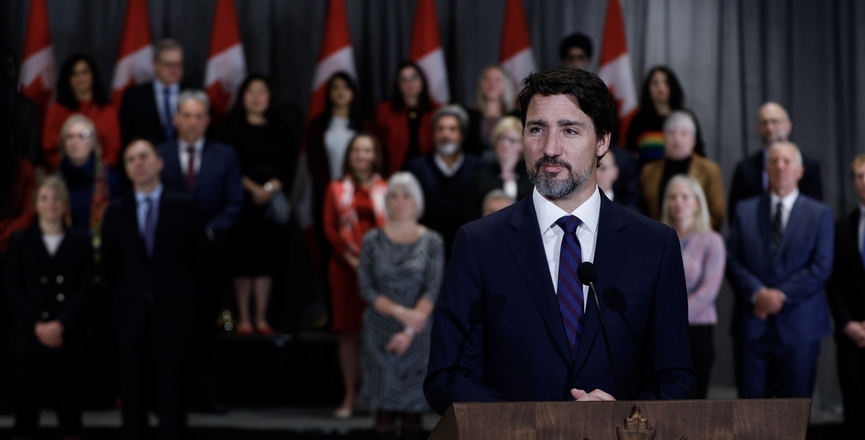Seeking re-election in 2019, the Liberal government came out with a surprise campaign promise: Canada would achieve net-zero emissions of GHG gases by 2050.
The move was classic Liberal politics. With the government’s election campaign faltering, and leader Justin Trudeau reeling from the publication of his blackface photos, party strategists decided to reposition the Liberals on climate change.
The net-zero promise moved the Liberals closer to both wavering Green party sympathizers, and potential vote-switching NDP electors whom the government hoped to snag as voters.
Most importantly, by asserting themselves on climate the Liberals distinguished themselves clearly from the Conservatives, the only party likely to replace them in power. Climate change denial by the Conservatives helped the Liberals form a minority government.
The Liberal government promised to set up an independent body to establish five-year interim emission targets, and advise on progress to net zero.
For good reason, environmentalists want net-zero emissions to be more than another Liberal talking point. The United Nations Intergovernmental Panel on Climate Change identified net zero by 2050 as offering at least a 50 per cent chance to keep average world temperatures from rising by more than 1.5 C.
So far, green campaigners are disappointed. The Trudeau government continues to promote fossil fuel projects, opposes nationwide Indigenous actions to halt the Coastal GasLink project on unceded Wet’suwet’en land and has no plan to improve Canada’s frightful performance on reducing GHG emissions.
In explaining Teck Resources’ decision to cancel its Frontier oil sands project, CEO Don Lindsay wrote about the role of “global capital markets” in prompting his company’s retreat.
Some energy company executives are finally recognizing that climate change represents a systemic risk to global capital markets.
Central banker Mark Carney takes net-zero emissions seriously. As head from 2011 to 2018 of the G20 Financial Stability Board, the international group tasked with re-setting world finance after the crash of 2008, Carney became convinced climate change could trigger another financial meltdown. In speeches that created waves, he warned bankers that fossil fuel lending carries with it significant risks that major oil and gas assets would become unprofitable as the world moves towards green energy sources.
Leaving his post at the Bank of England this coming March, Carney has signed on as a climate advisor to the UN secretary-general.
In preparation for the UN Climate Change Conference (COP 26) in Edinburgh this coming November, Carney wants bankers worldwide to commit to making emissions reduction part of lending requirements for energy projects and to demand that all corporate borrowers have plans for emission reductions — irrespective of the nature of their activities.
Carney, a native of the Northwest Territories with ties to Alberta, recently told The Sunday Edition on CBC radio that the smart money is on a green transition away from fossil fuel production.
Stranded assets include of course major Alberta bitumen projects, already ditched by Big Oil, and the controversial $40-billion B.C. LNG undertaking, unprofitable at current or projected prices.
It is not just Alberta Premier Jason Kenney or Saskatchewan Premier Scott Moe that have a problem acting to reduce GHG emissions. B.C. Premier John Horgan, Alberta Opposition leader and former premier Rachel Notley, and Justin Trudeau all support expansion of resource projects that push net zero back decades.
With Bernie Sanders now the likely U.S. Democratic party nominee, and holding a better than 50-50 chance of defeating Donald Trump (according to polling going back to 2016) Canadian fossil fuel supporters could face their biggest challenge ever.
As president, Sanders promised he would shut down the Keystone pipeline currently scheduled to bring Alberta heavy oil to the Koch Industries refinery on the Gulf of Mexico. Sanders wants to ban fracking, which might help Alberta heavy oil producers recapture markets lost to American fracking, but it would certainly put pressure on B.C. fracked gas producers.
Most importantly, Sanders plans to invest fully in a Green New Deal, an ambitious program to transition the American economy away from dependence on fossil fuels, and create well-paying jobs in new industries.
Similar ideas have been germinating around the world, including in Canada where in 2012 Canadian Centre for Policy Alternatives economists Marc Lee and Amanda Card detailed the need for a green industrial revolution.
Many European countries are taking steps to transition to the next economy, while in Canada the prime minister and provincial political establishments are determined to protect the old economy at great cost to the planet, their credibility with young Canadians and people attentive to scientific evidence.
Net-zero emissions was an electoral expedient, but it has wide, deep support. The Liberals would be well advised to take this promise seriously.
Duncan Cameron is president emeritus of rabble.ca and writes a weekly column on politics and current affairs.
Image: Justin Trudeau/Twitter
Editor’s note, February 26, 2020: An earlier version of this story misspelled the last name of the premier of Alberta. He is Jason Kenney, not Kenny.



